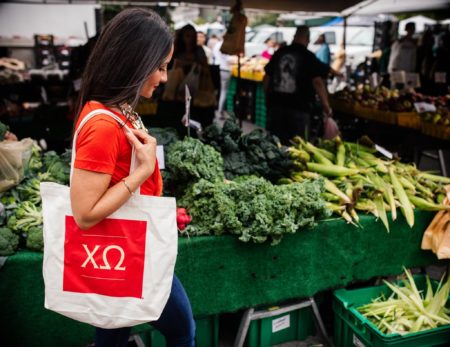More than ever, people are becoming aware of our food supply and where it comes from. That’s a good thing! But with that awareness, comes buzz words like “organic” and “local.” While helpful, for many people, these terms can be confusing in the produce aisle. One question I’m often asked is “What’s the difference between local and organic? Which is better?”
In short, there is a difference between local vs. organic food, but in my opinion, one isn’t better than the other. Each has its own benefits. Let’s break that down further.
Organic
If food is labeled organic, it means that it’s grown according to specific agricultural practices that must meet government standards. Most notably, that it’s grown without the use of chemical fertilizers and synthetic pesticides, antibiotics and genetically modified seed.
Other organic farming practices like crop rotation are more environmentally sound because they improve soil quality and encourage biodiversity.
Because we’re still unsure of the potentially damaging effects of genetic modification – a process whereby food is essentially engineered – and also because we know that synthetic fertilizers deplete the nutritional content of food and cause health problems in humans and animals, organic food is an all-around healthier choice than non-organic food.
Local
The definition of “local” is a little less clear-cut. To date, it can be defined as food grown somewhere within a 100- to 400-mile radius of a geographic region. Local food may or may not be organic, but being local isn’t a requirement for meeting organic certification standards. The best place to find local food is at your city or town’s Farmer’s Market, a CSA (Community Supported Agriculture) or food co-ops, but more supermarkets and food delivery services are stocking local produce and grocery items than before.
How to Choose?
It all sounds pretty cut and dry, right? Not exactly. Sometimes, organic food is grown far away and has to travel thousands of miles across the country (or countries) to reach the consumer. In this case, the environmental pollution from the food miles, or distance the food travels to reach you, the consumer, is far more damaging.
Also, because organic certification is both labor-intensive and expensive to obtain especially for small farms, plenty of locally-grown food isn’t labeled organic even if it’s farmed using sustainable – or even organic – farming practices.
Ultimately, the decision is up to you. Personally, we eat mostly organic food in our household, but when I have to make the choice, I will always choose local produce over organic. For me, this is an easy decision because local food is seasonal and fresh. I know it has traveled fewer miles to reach me and I can feel confident that I’m supporting the local community with my purchase. The bonus is that if you’re buying food from your local farmer’s market or CSA, you have the opportunity to meet the farmer, ask questions or even visit the farm to learn more about where and how your food is grown. In this way, I feel more connected to the food I’m eating.




Leave a Reply